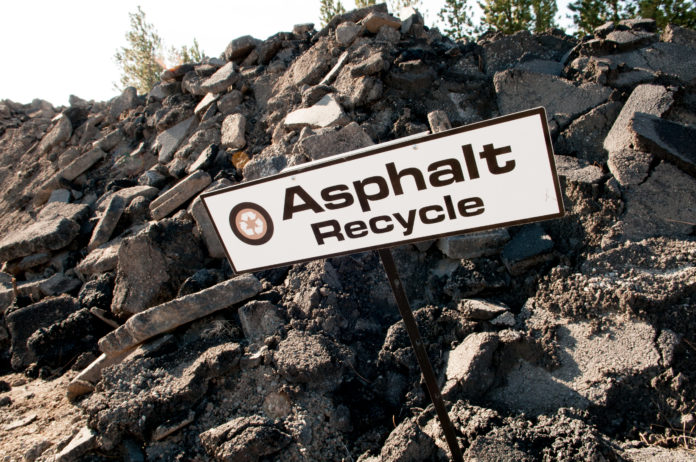When you consider the asphalt, you probably consider the roads. In any case, did you realize that material shingles, tennis courts and the linings of fish incubation facilities can be made with asphalt?
You may feel that asphalt is difficult to reuse, yet the precise inverse is valid. Turns out the asphalt then it is a standout amongst the most reused materials in the United States.
According to the report of Federal Highway Administration demonstrated that 81 percent of asphalt was expelled from roads and it will be extended in each year for reuse. Asphalt is anything but difficult to transform once again into the new asphalt, so there is an extreme demand for it. So how would you, as a property holder, discover a spot to reuse the asphalt?
Basically, What is asphalt?
- Asphalt is made by combining or joining the binding material that is called a bitumen with aggregate, for example, shake, stone or sand. The aggregate is normally oil based and left over from the unrefined petroleum into things like fuel or lamp fuel. It is conceivable to consolidate the asphalt with reused tires to make an item that is known as rubber treated asphalt.
- Asphalt is otherwise called as blacktop, landing area, macadam, black-top concrete, and bituminous cement. Asphalt has been around for an extremely lengthy timespan; the Mesopotamians and Phoenicians utilized the sticky bitumen material to seal showers, water tanks, and ships. The Babylonians were the first to utilize it for the structuring of the road.
- Scotsmen Thomas Telford and John Loudon McAdam utilized it to fabricate the roads during the 1800s. From that point onwards, the utilization of the material took off in Europe. It was prized for its capacity to diminish residue and mud, particularly in developing the industrialized urban communities.
- Asphalt is utilized for an assortment of surfaces including roads, driveways, airport terminal runways, race tracks, and play areas. Other than that it is being dependable, asphalt reduces the noise of the road, repulses water, helps to keep the vehicles from sliding and is easy to maintain.
Why should you recycle asphalt?
- In the year of 2002, according to the Federal Highway Administration has made an approach to expressing of reuse the asphalt in different materials which are utilized in roadways. According to FHWA’s, the main goal was to limit the effect on nature.
- There was some proof that utilizing to reusing the recycling content in asphalt really made a more grounded item, which would enable them to meet another piece of their main goal. Their goal is making sheltered, enduring the roads for Americans.
- Also, the FHWA understood that reusing the asphalt could save them a lot of cash, which could give them more assets to fix existing roads and assemble the new ones. This strategy mirrors the reasons to reuse the asphalt that makes well for everybody. The overwhelming, oil-based material occupies plenty of landfills and will never biodegrade.
- Utilizing reused asphalt can also decrease the cost of construction as oil costs increment, does the expense of asphalt. Utilizing some reused materials diminishes the assembling cost, which is great whether you are a citizen subsidizing another roadway or a property holder constructing a driveway.
Benefits of Asphalt Recycling
1. The recycled asphalt looks like the original:
It is one of the best things if you recycled the asphalt material. And when you see it after the recycling process then you will also wonder what it looks like as original and does not lose the quality. There are many people who argue about recycled asphalt pavement is high in quality rather than the original ones. But both will be durable and has a long life span.
2. It saves money:
While asphalt road pavement construction has been done on the road then most people will also go through it for their home installation and make it more attractive and valuable. According to the National asphalt paving association also estimates that many of the American people can save their tax while doing the recycling of the asphalt material. This is a great thing. If you recycled the asphalt then you can also save a lot of money. If you purchase the new material than it costs rise to very high but recycled cost is not that much as you can reuse it well in the affordable rates.
3. Asphalt increases the use of other recyclables:
These materials are also used for another industry as they recycled it into the asphalt and binding up the landfills attractively. Everything from glass and asphalt material shingles finds a home in new asphalt. You get profits by these options as well – each additional material carries another property to the blend.
Do you still think about the earth?
Expanded utilization of recycled asphalt as a level of the complete asphalt that can blend all together and decrease the ozone-harming substance discharges by disposing of the critical fuel utilization that is required to gain and process the raw materials for the virgin blend.
Stone, sand and rock, the aggregates of asphalt are really a constrained asset. Protecting these assets through reusing that is the basic to keep the roads sheltered and agreeable into the future.
Today, asphalt engineers, government organizations, and temporary workers see old asphalt as a benefit, not a squander, and the pattern to reuse and recycle on picking up force accordingly. There are numerous advantages of interest to reuse the asphalt, both for the environment and the consumer too.

































